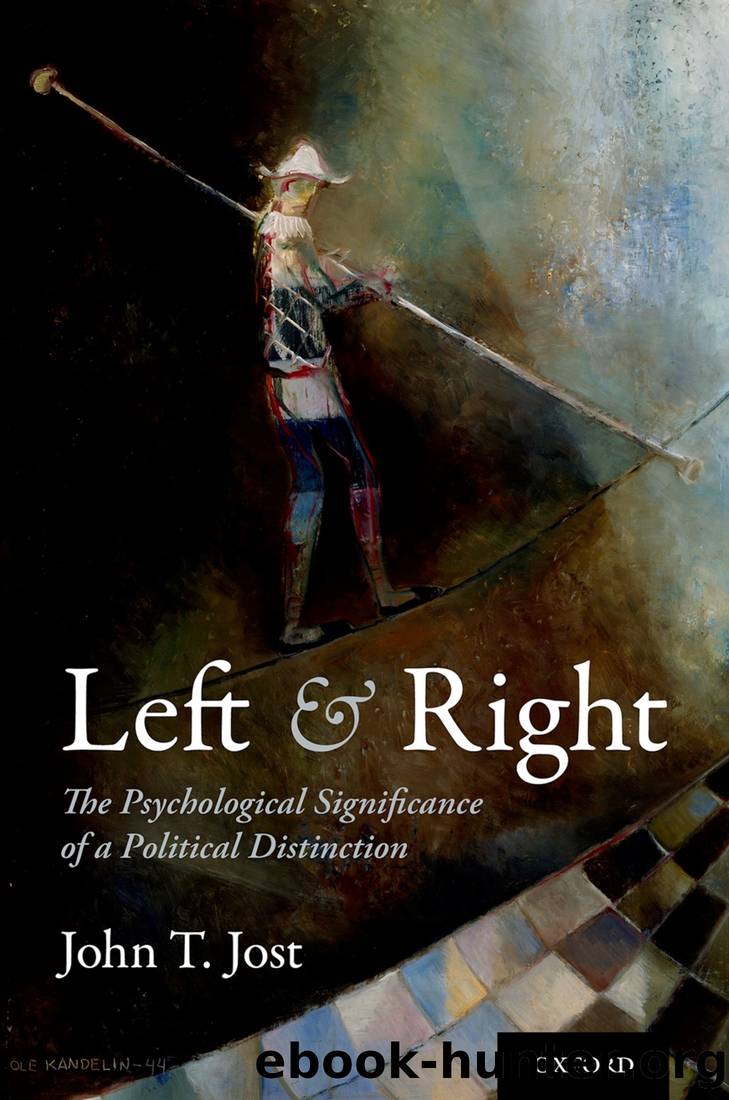Left and Right: The Psychological Significance of a Political Distinction by John T. Jost

Author:John T. Jost [Jost, John T.]
Language: eng
Format: epub
Tags: political science, Political Ideologies, General, Psychology, Social Psychology
ISBN: 9780190858339
Google: eVc1EAAAQBAJ
Publisher: Oxford University Press
Published: 2021-11-15T00:30:34.342550+00:00
Ideology Is Dead, Long Live Ideology
For decades, political scientists have doubted that ideology is a meaningful force in peopleâs lives. The kind of evidence brought together in this chapter and in the preceding chaptersâincluding hundreds of studies in political psychologyâis clearly at odds with the skeptical position. Ideology is not âout of reach,â as Kinder and Kalmoe (2017) claimed, for college students, office employees, Mechanical Turk workers, prospective voters, and survivors of terrorist attacks. On the contrary, it seems to be part of their public and private lives, in good times and bad.
A psychological approach to the study of ideology complements historical, philosophical, and sociological analyses of left and right as reflecting cultural developments and intellectual movements (Bobbio, 1996; Cochrane, 2015; Freeden, 2003; Laponce, 1981; Noël & Thérien, 2008; Vincent, 2010). It also builds onâand goes beyondâthe work of political scientists who for decades have stressed logical coherence, temporal stability, and political sophistication as defining characteristics of ideology.
Kathleen Knight (2006) posed two major questions concerning ideology, namely: âIs it a benign influence on democratic politics? And how far does it really penetrate into the public at large?â By returning to the key insight that ideology reflects social, cognitive, and motivational concerns and basic orientations pertaining to the management of uncertainty, threat, and social relationsâas well as implicit and explicit attitudes toward existing and alternative social systemsâpsychologically minded researchers have contributed insights that should be of use in answering Knightâs questions and many others as well.
The obvious shortcoming of psychological research is that it is seldom, if ever, based upon nationallyâlet alone globallyârepresentative samples. But this limitation should be weighed against a major problem with research on ideology in political science, which depends heavily upon cross-sectional correlational analyses from public opinion surveys that rely on tiny numbers of hand-picked items selected to be noncontroversial. Because of financial constraints, large public opinion surveys almost never include complete, well-validated instruments for measuring ideology, let alone the psychological processes we are seeking to analyze here (but see Azevedo et al., 2017, 2019, for a notable exception).
When we examine small samples of individuals in real depth, we see that the left-right (or liberal-conservative) dimension of ideology aptly characterizes much of what people think about when it comes to society, economics, and politics, as Lane (1962, 1969) also discovered through his interviews. But the influence of ideology does not end there. It is connected to the ways we live, eat, drink, travel, educate ourselves, have sex, watch TV, decorate our walls, and clean our bodies and our homes, and on how we spend our free time and cope with personal disasters and collective crises (Bonanno & Jost, 2006; Carney et al., 2008; DellaPosta et al., 2015; Eastwick et al., 2009; Jost, 2017c; Klofstad et al., 2012; Mutz & Rao, 2018; Rogers, 2020; Xu et al., 2013; Xu & Peterson, 2017). As a psychological orientation, ideology and its trappings are everywhere.
Download
This site does not store any files on its server. We only index and link to content provided by other sites. Please contact the content providers to delete copyright contents if any and email us, we'll remove relevant links or contents immediately.
Spare by Prince Harry The Duke of Sussex(5176)
Machine Learning at Scale with H2O by Gregory Keys | David Whiting(4292)
Fairy Tale by Stephen King(3370)
Will by Will Smith(2908)
The Bullet Journal Method by Ryder Carroll(2561)
Hooked: A Dark, Contemporary Romance (Never After Series) by Emily McIntire(2548)
Rationality by Steven Pinker(2352)
It Starts With Us (It Ends with Us #2) by Colleen Hoover(2341)
Can't Hurt Me: Master Your Mind and Defy the Odds - Clean Edition by David Goggins(2323)
Friends, Lovers, and the Big Terrible Thing by Matthew Perry(2219)
The Becoming by Nora Roberts(2188)
Love on the Brain by Ali Hazelwood(2059)
A Short History of War by Jeremy Black(1842)
The Strength In Our Scars by Bianca Sparacino(1840)
HBR's 10 Must Reads 2022 by Harvard Business Review(1839)
Leviathan Falls (The Expanse Book 9) by James S. A. Corey(1726)
A Game of Thrones (The Illustrated Edition) by George R. R. Martin(1721)
515945210 by Unknown(1660)
Bewilderment by Richard Powers(1607)
